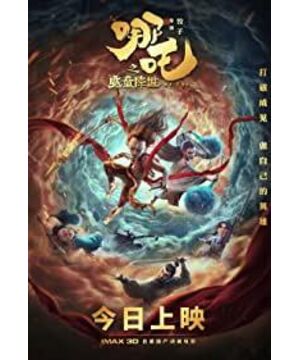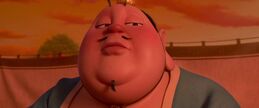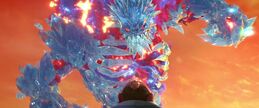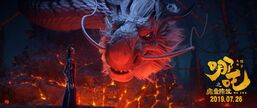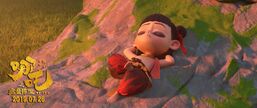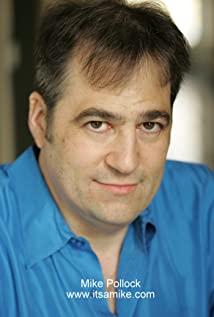father-son relationship
The two versions of Nezha that I remember the most, one is TVB's "Fengshen Bang", Chen Haomin plays Nezha, Yuan Hua plays Li Jing, and Yuan Qiongdan plays Mrs. Yin; the other is CCTV's cartoon "The Legend of Nezha".
In these two versions of Nezha's story, the relationship between Nezha and Li Jing's father and son is very tense.
In the usual image building, Li Jing belongs to the kind of character who is selfless and even righteous and kills relatives. On the one hand, he completely conforms to people's definition of a virtuous gentleman; on the other hand, he is also a typical feudal patriarch, a symbol of patriarchal power.
Mrs. Yin acts as a moderator between father and son. She is the kind of mother who endures humiliation and bears the burden of humiliation, and she has a lot of crying scenes. (Especially Yuan Qiongdan's version of Mrs. Yin's crying scene, the crying is a heart-wrenching one)
"The Devil Comes to the World" has adapted many images of the Nezha family. Among them, Nezha has the most obvious changes on the surface. He has become ugly and has become a "magic boy" with smoky makeup, but in fact, the core has not changed much. Because no matter which version, Nezha was originally a negative image of making trouble for misfortune.
The most adapted is actually Li Jing. As the chief soldier of Chentangguan, he still meets the definition of a gentleman, but he is no longer the feudal parent who kills his relatives righteously, but presents the other side of Chinese-style parenting: protecting the calf, doting, and even Sacrifice yourself, put your life on the line.
The thing that moved me the most in the film was the dialogue when Li Jing decided to die for Nezha:
"Nezha who are you?"
"He is my son."
This sentence came out of Li Jing's mouth, and I didn't feel the slightest sense of disobedience. Indeed, even in the images of father and son fighting against each other in the past, it is difficult for me to believe that Li Jing must have hated Nezha.
I think that in traditional Chinese family relationships, children can hate their fathers, but fathers will never really hate their children. At most, their hatred comes from the thinking of feudal parents, annoyed that the children did not act according to their own wishes.
Chinese-style parents are complex and multi-faceted. Righteous extermination and over-indulgence are not in conflict at all, and they can all appear in the same person.
China and the Dragon
"The Devil Child Comes to the World" has made a relatively large adaptation of the relationship between Nezha and the third prince of Long, Ao Bing, but the identities of the two people's old enemies are not considered to subvert the original mythological image.
The high-burning node of the film is naturally the scene in which Ao Bing transforms into a dragon and intends to bury the entire Chentang Pass alive with the ice cap, while Nezha transforms into a young man and withstands the ice cap from below.
Ao Bing and Nezha, Lingzhu and Magic Pill, Blue and Red, Ice and Fire, Dragon and Human...
I very much hope that this film can be seen by foreign audiences, because in Western stereotypes, the relationship between the Chinese and the dragon is the same as the relationship between the Mongolian and the wolf in "Wolf Totem".
Yes, the Chinese call themselves the descendants of the dragon, and the Chinese totem worship is also the dragon. In Western movies and TV dramas, Chinatown will always have the image of a dragon, triads also have dragon tattoos, and they will dance dragons and lions during the Chinese New Year... But the relationship between Chinese and dragons goes beyond that.
There is no shortage of stories in Chinese mythology about "revolting against authoritarianism", such as havoc in the heavenly palace, or Nezha in the sea. The Chinese worship the dragon and regard the dragon as auspicious, but the Chinese will also rebel against the dragon, as long as it is in the interests of the people.
Chinese traditional culture is also complex and multi-faceted, but this is the real China, and this is the more worthy "cultural export".
In addition, in the section where Nezha was discriminated against and excluded from the villagers, I instantly jumped to "Naruto", thinking that this is Naruto Uzumaki? But on second thought, Nezha was much earlier than Naruto. If we were to say imitation, Japan imitated us.
It is really our cultural export. Our right to speak has been suppressed for too long. Fortunately, we will slowly take it back.
other
Before that, I was very uninterested in the term "Rise of Guoman". To use a self-deprecating statement, it is: Guoman rises 365 times a year, and every work is hyped with "Rise of Guoman".
Including "The Return of the Great Sage", which was regarded as a landmark before, I watched this film later, and I could hardly watch it. I felt that the picture and plot were still rough. Other works such as "The Great Protector" and "The Origin of the White Snake" can be seen, and the quality is good, but I always feel that there is something missing.
After watching "Nezha's Devil Child Comes to the World", this emptiness has finally been filled in some way, because finally there is a domestic animation, which presents the way of thinking Chinese people should have, and presents the real world outlook and values of the Chinese people.
View more about Ne Zha reviews


